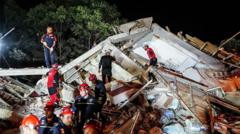The recent missile attack by Iran on a US base in Qatar demonstrates rising hostilities in the region, escalating after American strikes aimed at Tehran's nuclear sites.
Iran Targets US Base in Qatar in Retaliation to Strikes on Nuclear Sites

Iran Targets US Base in Qatar in Retaliation to Strikes on Nuclear Sites
Iran launched missiles at the Al-Udeid US military base in Qatar, marking a significant escalation in tensions following US airstrikes on its nuclear facilities.
Iran executed a missile attack on the Al-Udeid military base in Qatar on Monday, characterizing the act as retaliation against recent US bombings of its nuclear facilities. Eye-witnesses in Doha reported loud explosions, supplemented by videos depicting bright streaks in the sky as air defense systems engaged incoming missiles.
Former President Donald Trump referred to the assault as "very weak" and viewed it as anticipated, indicating that this might pave the way for potential peace in the region. On Tuesday, he announced a ceasefire agreement between Israel and Iran.
Iran’s military confirmed the missile strike through state media, asserting that it targeted the largest US military facility in the Middle East, which also hosts a portion of British military personnel. The Islamic Revolutionary Guard Corps (IRGC) released a statement emphasizing Iran's commitment to defend its sovereignty, insisting that "US bases in the region are not strengths but vulnerabilities."
While Iranian sources claimed six missiles were launched, a US assessment indicated 14, and Qatar's report suggested 19, all of which they asserted were intercepted with no reported casualties. In response to the growing tensions, both the US and UK advised their nationals in Qatar to "shelter in place," highlighting the approximately 8,000 American and several thousand British nationals residing there.
Following the missile strikes, it became clear that Iran had communicated its intentions to Qatar beforehand, likely to minimize casualties. Trump noted this warning in his remarks, attributing the lack of injuries to Iran's advance notice and underscoring his belief that the attack represented an outlet for Iranian frustrations. Meanwhile, Qatar's foreign ministry condemned the attack, calling it a "flagrant violation" of its sovereignty.
Iran’s supreme leader, Ayatollah Ali Khamenei, asserted the nation’s right to respond to perceived violations. He stated, “We have not violated anyone, and we will in no way accept being violated by anyone.”
As tensions peaked, Iran concluded the barrage by launching "a last round of missiles" aimed at Israel before the ceasefire took effect. The Israeli government responded firmly, indicating they would retaliate against any breach of the ceasefire.
Leading up to the missile strikes, US intelligence had indicated potential Iranian preparations, with Qatar closing its airspace temporarily. Reports indicated that some US planes diverted their routes away from Doha in anticipation of the missiles.
This series of events follows escalations beginning earlier this month, when Israel initiated attacks on Iranian nuclear and military sites, prompting US involvement aimed at hindering Iran's nuclear capability. Despite Iran's insistence that its nuclear pursuits are civilian, the current political climate raises the urgency of diplomacy to mitigate further hostilities.





















